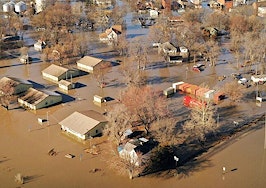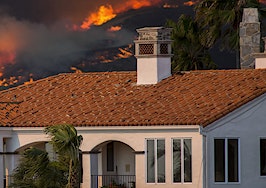Just a few days ago, Orlando-area real estate agent Eric Rollings was talking to his parents, Michigan-based snowbirds who’ve had a home on the Florida coast for decades. And they talked about the area’s Blue-green algae blooms that give off harmful toxins.
They discussed recent fish die-offs, which have scuttled local businesses and recreational fishers alike.
And they lamented Florida’s red tides, a kind of air-choking algae bloom that Rollings described as “like a bomb underwater.”

Eric Rollings
“My mom’s really sensitive to red tides,” Rollings, an agent at Mainframe Real Estate, said. “My dad, he was like ‘if the state’s not doing anything more about it and it continues to become more and more severe we’ll just sell this place.'”
None of the phenomena that Rollings discussed with his parents are new, but they are getting worse thanks at least in part to climate change. And as a result, the comment about selling the beach house highlights a growing intersection between a natural environment increasingly thrown out of wack and the real estate market.
That intersection is only just now coming into focus, but even so, it’s already clear that some of the most climate change-vulnerable places are also the ones that are most appealing to people like Rollings’ parents: investors buying second homes, vacation properties, rentals and more. It follows, then, that climate change poses a significant challenge to the world of real estate investment, even if the components of that challenge remain to be determined.

Red tide at a beach in Florida. Credit: TriggerPhoto and Getty Images
The overlap between climate change and high-demand real estate destinations is abundantly clear from numerous studies. A 2017 report from Climate Central, for example, found that of the 20 coastal cities most susceptible to flooding, 17 are in Florida. Miami took the second place spot on the list (after New York City), and its suburbs rounded out the top five.
A climate change study released in August by flat-fee brokerage Clever Real Estate additionally showed that some of the cities that are “most vulnerable to climate change hazards are also the least prepared for them.” That study looked at hazards beyond flooding, such as extreme temperatures, but still identified Miami and nearby Hialeah as among the communities most at risk.
Clever’s report also found that Anaheim, Calif. — home to Disneyland — is among the cities least prepared for climate change.
Researchers in other studies have identified a host of other vulnerable cities and issues, but the point here is ultimately that climate change is going to impact numerous communities, a number of which are especially attractive to investors.
However, to a large extent, those investors haven’t quite taken the reality of climate change to heart yet.

Sean Frank
“In our market, it’s not something that’s talked about much, and I think it’s almost completely off everybody’s radar,” Sean Frank, CEO of Mainframe Real Estate, told Inman.
“It’s very very very very rare,” Tiffany McQuaid, president of McQuaid and Company, replied when asked how often climate change comes up with clients. “As of right now, it hasn’t become a big issue.”
McQuaid even recalled an instance last year in which a client bought a beach-front condo — which was going to be a second home rather than a primary residence — for around $10 million during a red tide event.

Tiffany McQuaid
“Every time we were showing the property, you were coughing like crazy,” McQuaid recalled. “Amazingly, that buyer felt like they really wanted beachfront. They were willing to overlook [the red tide].”
Real estate professionals who spoke to Inman for this story and others have shared similar stories, saying that real estate investment in their markets does not appear to be impacted longterm by the kinds of events — hurricanes, wildfires, etc. — that climate change is making worse.
But there are signs that things are changing and that climate change is landing on more people’s radars. Rollings, for instance, said that in addition to his parents raising concerns, a buyer recently backed out of a $6 million property due to a particularly bad red tide.
“He said, ‘the best part about Florida is your water and your beaches,'” Rollings recalled, “‘but what’s the point of buying a $6 million house on the beach if I can’t even use it.'”
In that particular case, the man was so turned off by the red tide and related problems that he abandoned the substantial deposit he put down on the property, Rollings added.
Rollings also said other specific events have impacted the market in the short term. He said that in 2004, for example, a series of hurricanes swept through the Orlando area, and afterward, it became harder to sell properties.

A flooded street in Florida. Credit: djjohn and Getty Images
So is climate change ever going to create a sustained impact on real estate investment?
Frank suggested that it could at some point if there is a single event that hammers a particular area.
“It could start a snowball effect and people just start leaving,” he said, adding that after hurricanes Katrina and Maria, in New Orleans and Puerto Rico, respectively, a significant number of people left ravaged communities — and never went back. And as the population declines, real estate loses value.
“My take on it is it’s just a matter of when does the first domino fall,” Frank added.
He also suggested that investors, in particular, could be more sensitive to climate-driven market fluctuations. Unlike buyers of primary residences, who might want amenities or have an emotional interest in a property, investors are looking to make a profit. And that means they’re especially susceptible to changes in demand, or to natural phenomena that might damage their investments.
The rising cost of preparing for future disasters may also price some investors out. Frank noted that insurance, among other things, has already become a major issue for property owners in flood-prone places, but that without it, a buyer can’t get a mortgage.
“It’s very expensive to have flood insurance and it’s only going to get more expensive,” Frank added.
Indeed, insurance increasingly looks like the weakest link when it comes to sustaining the real estate industry in areas that are vulnerable to climate change. In California, property owners are facing soaring insurance rates thanks to years of devastating wildfires that experts say are worsened by climate change.

The Blue Cut Fire sweeps through a community near Wrightwood, California, on August 17, 2016. Credit: David McNew and Getty Images
Flood insurance is even trickier. Most owners who have flood insurance get it from the government, but the federal program has been mired in reform efforts for years, with recent developments suggesting rates could be going up.
Other costs may rise as well.
Francesca Ortegren, a research associate at Clever who studies climate change, told Inman that property taxes could end up rising as cities have to spend more money on infrastructure. Building codes across the U.S. may also have to be updated to better insulate against extreme heat and cold. That’s good news for anyone who wants a warmer or cooler home, but bad news for investors facing thin margins.
“It’s going to be harder for people to afford those properties,” Ortegren said. “You also have to consider at the larger scale, companies who are investing in property want to see a pretty quick payout.”

South Beach, Miami. Credit: Pola Damonte and Getty Images
Ortegren described these scenarios as longer-term projections, but in the short term, everything isn’t doom and gloom. Vacation rental management company Vacasa, for example, told Inman that while it doesn’t have any specific climate program in place right now, “local teams are prepared to activate and assist in times of need.”
McQuaid also said that climate change is altering the way that some people think about vacation-oriented destinations. It used to be, for example, that no one wanted to come to Florida in the summer thanks to the intense heat and humidity. But as temperatures rise across the U.S., Florida’s summer weather is less of an outlier.
And whatever else is going on, investors today still seem willing to take the risk on properties in areas that could see climate impacts in the future.
“I am finding,” McQuaid said, “that people are staying in the present.”




